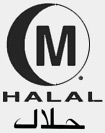認(rèn)識(shí)Halal和Halal認(rèn)證 / Halal and Halal certification
HALAL在阿拉伯語(yǔ)中的意思為合法的或允許的,與HALAL相反的是HARAM,意思為不合法的或禁止的。雖然HALAL和HARAM是適用于生活各方面通用的術(shù)語(yǔ),但是我們只在與食品、肉類(lèi)產(chǎn)品、化妝品、個(gè)人護(hù)理產(chǎn)品、食品配料,以及與食品有接觸的原料方面使用這些術(shù)語(yǔ)。
盡管許多物質(zhì)是被清晰地劃分為HALAL或HARAM,但是還有一些物質(zhì)是未被劃分的,這些物質(zhì)被認(rèn)為是不肯定或可疑的,同時(shí)需要更多信息將它們歸類(lèi)為HALAL或HARAM,這些物質(zhì)稱(chēng)為MASHBOOH,意思是可疑的或不肯定的。
除了以下被認(rèn)定為HARAM的食品外,其他食品通常認(rèn)為是HALAL的。
- 豬及它的副產(chǎn)品;
- 不恰當(dāng)屠宰的動(dòng)物或屠宰前死亡的動(dòng)物;
- 除了以ALLAH(主)的名義外屠宰的動(dòng)物;
- 酒精和酒精飲料
- 血及它的副產(chǎn)品;
- 受以上任何一項(xiàng)產(chǎn)品污染的其他食品。
Halal is an Arabic word meaning ‘lawful’ or ‘permitted’. The opposite of Halal is Haram, which means ‘unlawful’ or‘prohibited’. When it comes to food and consumables, halal is the dietary standard of Muslims.All pure and clean things are considered halal except for the few following exceptions.
While many things are clearly Halal or clearly Haram, there are some things which are not clear. These items are considered questionable or suspect and more information is needed to categorize them as Halal or Haram. Such items are often referred to as Mashbooh, which means doubtful or questionable.
All foods are considered Halal except the following, which are Haram.
- Swine/pork and its by-products
- Animals improperly slaughtered or dead before slaughtering
- Animals killed in the name of anyone other than ALLAH ( God )
- Alcohol and intoxicants
- Carnivorous animals, birds of prey and land animals without external ears
- Blood and blood by-products
- Foods contaminated with any of the above products
HALAL認(rèn)證是由一個(gè)有資質(zhì)的第三方審核認(rèn)證產(chǎn)品的生產(chǎn),并證實(shí)生產(chǎn)是符合伊斯蘭對(duì)生產(chǎn)的準(zhǔn)備和原料標(biāo)準(zhǔn)要求的過(guò)程。一旦第三方對(duì)產(chǎn)品工藝進(jìn)行審核并接受后,將會(huì)授予生產(chǎn)商HALAL證書(shū),以證明產(chǎn)品符合HALAL要求。盡管Halal要求食品要衛(wèi)生、純凈,但是Halal認(rèn)證會(huì)將食品安全的問(wèn)題交由政府監(jiān)察機(jī)構(gòu)來(lái)處理。
Halal Certification is the process of having a qualified independent third party supervise the production of consumables, attesting that they were produced in conformity with the preparation and ingredient standards of the Halal lifestyle. After successful adoption and performance of halal productivity procedures, the supervisory third party then issues Halal Certification to the producer attesting to Halal conformity on a per product basis. While halal requires food to be wholesome and pure, Halal Certification has left the issue of food safety ti the government regulatory bodies.

